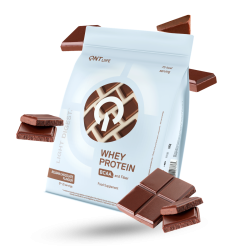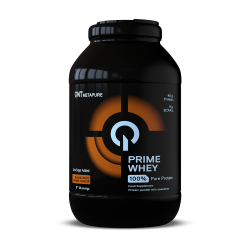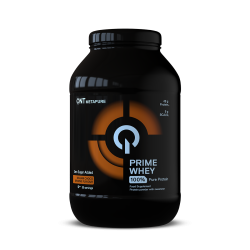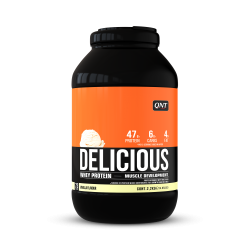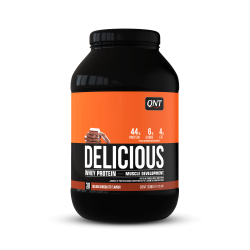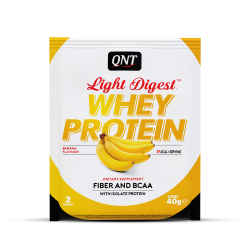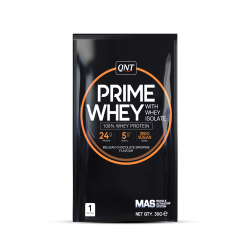The Whey Protein: The Holy Grail of Proteins for Athletes
Whey Protein is one of the most widely used proteins among athletes and is even considered indispensable among some enthusiasts. Protein extracted from cow's milk, it is highly sought after for its many beneficial properties. Quick to absorb and easy to digest Whey protein helps in the maintenance of muscle tone and muscular development.
There are 7 products.
The Whey Protein, Queen of Powdered Proteins
The Whey Protein, also known as whey protein, is a staple in the world of sports, particularly in bodybuilding. Derived from animal sources, this protein is rich in essential amino acids, making it a preferred choice for those looking to optimize their performance and recovery.
The Importance of Protein in Bodybuilding.
Proteins are essential in the world of bodybuilding, playing a central role in muscle construction and development. After intense training, damaged muscle fibres need repair to become stronger and more resistant. Whey Protein, with its high concentration of amino acids, is crucial to this process. It acts directly on the muscles, promoting not only repair but also growth. In addition to this, Whey Protein helps to prevent muscle breakdown, a crucial aspect for bodybuilders and athletes looking to increase their lean muscle mass.
Low Fat, Rich in Nutrients.
Whey Protein, extracted from cow's milk, is a by-product of the cheese-making process. The whey obtained is then transformed into a powder rich in protein, but low in fat and sugars. This exceptional nutritional profile makes Whey Protein one of the most sought-after protein powders on the market. It is particularly valued for its ability to provide a high-quality protein source without adding unwanted fat to the diet, which is essential for those watching their calorie intake.
The Nutritional Benefits of Whey Protein.
Whey Protein is not only rich in essential amino acids, it is also highly digestible thanks to its rapid assimilation process. Its high biological value makes it an ideal choice for athletes looking to improve their performance while supporting their overall health. In addition, Whey Protein contains immunoglobulins and lactoferrins, which help to strengthen the immune system, an often overlooked but crucial benefit for athletes undergoing rigorous training.
When to take your Whey Protein?
Whey Protein consumption is often associated with the use of a shaker, making it a convenient, quick and effective way to consume this essential protein. It can be taken at any time of day, but is particularly effective when consumed immediately after training, as this is when muscles need protein the most to begin the repair and growth process.
Timing of Whey Protein Intake.
To maximise the benefits of Whey Protein, it is recommended to consume it between meals and immediately after training. This timing triggers the anabolic process, helping to rebuild damaged muscle fibres. Its rapid assimilation rate is also beneficial for post-training recovery, providing the muscles with the nutrients they need to repair themselves quickly and effectively.
Everyday Whey Protein.
In addition to its use around training, Whey Protein can be consumed in the morning to prevent cravings or to replace a carbohydrate-rich breakfast. It can also be incorporated into various recipes throughout the day to ensure a constant protein intake, which is crucial for muscle recovery and growth. Whey Protein can be added to smoothies, yoghurts, or even used in the preparation of healthy meals, offering an easily accessible and delicious source of protein.
Whey Protein and Recovery.
Recovery is an aspect often neglected in the world of sport. Yet it is during this period that muscles repair themselves and become stronger. Whey Protein, with its rapid assimilation rate, is ideal for speeding up this process. It provides a source of protein that is rapidly available to the muscles, which is essential for rapid and effective recovery.
How Whey Protein Facilitates Recovery.
Whey Protein is rich in leucine, an amino acid that plays a crucial role in protein synthesis. After a workout, consuming leucine can speed up recovery and reduce muscle soreness, allowing you to come back faster and stronger for your next session. In addition, Whey Protein helps to reduce levels of the stress hormone cortisol, which can be elevated after intense training.
Whey Protein and Sports Performance
Whey protein isn't just good for building muscle. It is also effective in improving performance in a variety of sports, including endurance sports such as cycling and running. Its ability to provide a fast source of high quality protein is essential to support sports performance at all levels.
Whey Protein for Endurance Athletes
Endurance athletes can also benefit from Whey Protein. It can help reduce the muscle breakdown that occurs during long training sessions, allowing for better performance and faster recovery. By providing a high-quality protein source, Whey Protein helps endurance athletes maintain muscle mass, improve endurance and speed recovery after exercise.
Conclusion
Whey Protein is undoubtedly one of the best options for those looking to improve their athletic performance and overall well-being. Its richness in essential amino acids, low fat and sugar content, and ease of assimilation make it a must-have choice for any serious athlete. So, what are you waiting for? Incorporate Whey Protein into your diet and start feeling the benefits today. More information on proteins in our article devoted to proteins.
Our Whey Protein
Light digest
Zero added sugar
Rich in fiber
Includes a high concentration of BCAAs
Prime Whey
Contains 50g of protein per serving
Includes no added sugar
Rich in BCAAs
Delicious
Extremely soluble, which makes it fun to drink
No sugar added
47g of protein per serving
